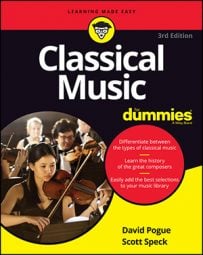A classical music concert is a wonderful event for lovers. Think of all the love songs that refer to orchestral music: “I hear violins.” “I hear a symphony.” “It’s music to my ears!” Orchestral music has been synonymous with romance for decades. Just think: Violins! Harps! Tubas!
Well, okay — violins and harps.
If you’re out on a date and want to impress your beloved with your taste, culture, and romantic instinct, you simply can’t do better than an evening of classical music. This well-planned evening of romance won’t lead to further romance, however, unless you take certain things into account:
What kind of group are you going to hear? If it’s a full orchestra, you almost can’t go wrong. If it’s a string group (violins, violas, cellos, and bass), the music is most likely to be suave and melodic. If it’s a brass group, it’s more likely to be powerful, loud, and triumphant. If it’s a group of harps, check to see whether everybody around you is wearing white. If so, you’re probably dead.
What style or period of music are you going to hear? This question is exceptionally important. You can use the Classical Music Timeline to see what period each composer on the program belongs to. That gives you some clue as to the character of what you’re about to hear. Baroque music is expressive, but in a highly stylized way. Classical period music is lovely and gracious, yet emotionally reserved. Romantic music is lush, gorgeous, and very expressive.
What is the music about? Occasionally, classical works have a story associated with them. This story is always described in the program. Because some of these stories can be somewhat embarrassing in romantic situations, you may want to avoid some pieces on a date (especially if you don’t know each other very well) — for example:
Medea’s Meditation and Dance of Vengeance (by Samuel Barber, 1946): A brutal masterpiece about a mythical character, Medea, who goes off the deep end and kills her kids.
The Rite of Spring (by Igor Stravinsky, 1913): A truly incredible piece of music, originally a ballet, and perhaps the most influential classical work of the 20th century. But it’s dissonant, violent, and oh so graphic. A virgin girl is sacrificed to the gods, forced to dance until she dies. Rated R.
Daphnis and Chloé, Suite 2 (by Maurice Ravel, 1912): A brilliant and charming piece for orchestra and chorus, also originally a ballet, with lovely depictions of nature. One of the depictions of nature, however, is a widespread “General Dance” (read: orgy) at the end. If any piece of orchestral music is X-rated, this one is. The music to this final scene (especially the wordless moans of the chorus) is sexually suggestive and may cause some uncomfortable squirming on the part of some members of the audience.
Symphonie fantastique (by Hector Berlioz, 1830): Another great masterwork, one of the cornerstones of the repertoire. It’s about a man who can’t get his beloved out of his head, takes enough opium to sterilize a moose, and dreams of murdering his girlfriend. Save this one for marriage.
On the other hand, depending on the relationship, some of these pieces may be just the ticket.

